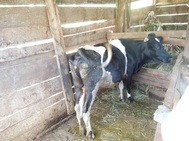
 Thanks to an initiative led by several international volunteers and headed by our friend from America, Elizabeth Mitchel, KIHO will implement the construction of at least three biogas plants in Mkume sub-village in the Pare mountains. Eventually, ten biogas plants shall be constructed in an effort that local communities benefit from this rather simple technology. In fact, the small-holder farmers just need to use the cow-dung manure, mix it with water, and then the locally-made biogas plant is producing biogas for them.
0 Comments
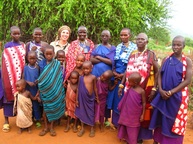 With a three day visit in Chome last week, the first phase of assessing the potential of eco-cultural tourism has been concluded for KIHO. We learned many things during our visits to a traditional healer, a Maasai boma, Gonja village, Tona Lodge in Mbaga, the tourist offices in Lushoto in the Usambara mountains as well as Chome with Shengena Forest. It was very interesting to see the successes but also the challenges that other places that have tourism established to some degree face with their visitors. We hope to start soon with this project that will help the local communities to generate additional income. 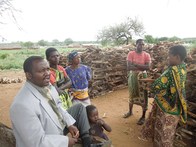 On Monday, KIHO visited some rural women in Kirinjiko, a sub-village of Chajo. It is a 15 minutes drive from Same town along the tarmac road to Dar es Salaam and the sub-village consists of some 70 households. In earlier times, the women sold charcoal to people-passing by in their vehicles on this busy road. However, all the big trees in the area have been cut down in the meantime, bringing the charcoal-making business to a halt. Today, the women rely on selling firewood. However, around their area even the smaller trees have been cut down. 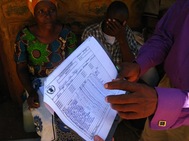 One of the main challenges that we have encountered working in the field with local communities is the lack of statistics. In Tanzania there isn’t a culture of keeping records of what has been done in the past and what is currently happening. The failure to do so has a negative impact on planning for the future because adequate statistics are just not available. Whether it is the individual farmer, local community initiatives or even the official village or sub-village representatives: they are all united by having little or no statistics available to very important and basic things of their surroundings. This gap is not a minor challenge, it is in fact one of the main challenges that rural community development is facing! 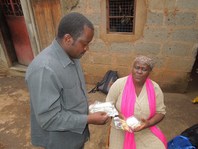 KIHO director Kateri Daniel Genes and the three EU Aid Volunteers went for a two-day trip to Moshi and Arusha to learn more about agricultural and income-generating initiatives. On Monday we visited a woman, Mama Anna Shoo just outside of Moshi, a place called Maili sita. Mama Anna is involved in mushroom production, solar-drying of vegetables, fruits and mushrooms as well as in wine production made out of rosella (hibiscus). Since ten years Mama Anna is engaged in the women initiative called “Shiri Tumaini Group”. 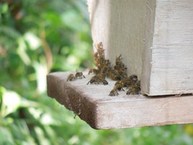 There is another project proposal that KIHO has submitted to the U.S. embassy last Friday. We asked for the support of a beekeeping group called Umoja wa Wafugaji Nyuki Vumari (UWAVU or “Union of the Beekeepers in Vumari”). Since 2010, UWAVU practices beekeeping in Ruvu, an area of high-tension along the Pangani river basin, an ideal place for beekeeping. In the meantime, also the Maasai community has become interested in this activity and want to join UWAVU. Consequently, they need some external support. Therefore, KIHO wrote a proposal in English for them, based on several discussions and meetings with UWAVU and the new Maasai members. They hope to receive 60 “modern” beehives, equipment and harvesting tools. 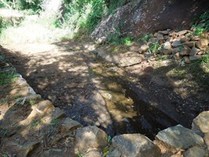 Today we have submitted a project proposal for the “U.S. Ambassador’s Special Self-Help Fund” which is organized by the U.S. embassy in Dar es Salaam. It is only a grant of $5,000 (an equivalent to TSH 8 million), but it could change the live of smallholder farmers in the Pare mountains. The project is to restore and upgrade a water irrigation pond in Mhero village located close to Shengena Forest. An initiative from Mhero approached a KIHO delegation during a visit in early February 2013, and stressed that one of their main needs are the restoration of water irrigation ponds to allow farming throughout the year and combat food insecurity. 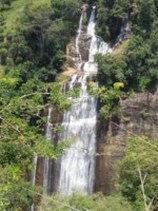 Today our three volunteers from Europe returned from Gonja, a village in the Pare mountains close to Shengena Forest. They stayed with one of KIHO’s board members, Mr. Seraphine, for one week. The aim of the stay was to find out the potential of eco-cultural tourism in Gonja, as one of several villages in the southern Pare mountains that could be included in such an initiative. Already since quite a while, KIHO board members are wondering to support an initiative of eco-cultural tourism or as it could also be dubbed, solidarity tourism. The idea is to travel responsibly to areas that conserve the environment, exchange cultural practices and improve the well-being of local people. 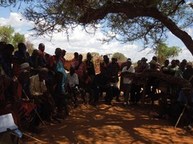 On Saturday, a KIHO delegation returned from a four-day trip to different villages in Ruvu ward, located next to Pangani river basin. The area is in the lowlands in the extreme west of Same district and it is indeed very hot and dry there. Nonetheless, there is a lot of farming going on in the meantime thanks to water irrigation canals that has made the land very fertile. However, there is conflict and tension between cattle-keepers and farmers in the area. Both groups depend on water from the Pangani river (or the irrigation canals). 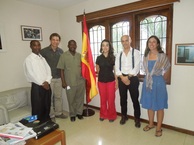 KIHO is happy to inform you that two of our board members together with our three European volunteers have successfully visited embassies and potential donors during four days last week. Overall, we met five embassies and three other international organizations during our time in Tanzania’s big city. |
News UpdatesOn this page you can find news updates about KIHO. Please feel free to comment. Archives
November 2014
Categories
All
|
 RSS Feed
RSS Feed
